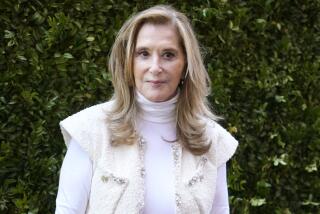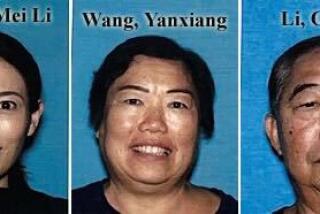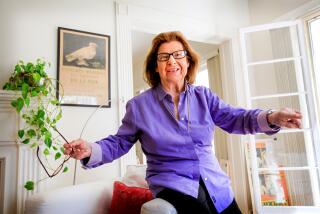Edie Wasserman dies at 95; Hollywood philanthropist and wife of studio chief
Edie Wasserman, who was the widow of Hollywood powerhouse Lew Wasserman and who was known as a tireless benefactor for charitable causes, especially the Motion Picture and Television Fund, has died. She was 95.
Wasserman died Thursday in Beverly Hills of natural causes, said her grandson, Casey Wasserman.
“She was an incredible woman, sort of once in a lifetime,” he said. “She had very strong convictions and was dogged in her pursuit of those. And they usually involved helping others.”
Actress Jamie Lee Curtis, who was her goddaughter, said in a statement: “The world lost a dynamic force for good in Hollywood. Her partnership and marriage to Lew Wasserman is one for the history books.
“Her great philanthropic endeavors .... will bear beautiful fruit long after her passing,” Curtis said. “She was sweet and sharp, tough and tender. She was a unique and fascinating woman.”
With her husband, Wasserman helped raise millions for the fund, which cares for aging actors and others in the industry. The fund publicly thanked the couple by naming its 40-acre Woodland Hills campus after them in 1998.
In typical fashion, Edie — who preferred to stay out of the limelight — privately told the fund’s board: “If you find somebody to give more money than I’m giving, then change the name.”
Decades after arriving in Los Angeles in the late 1930s, the Wassermans had become “the undisputed king and queen of Hollywood among the baroque society of Rodeo Drive,” Kathleen Sharp, author of a biography about the couple, told The Times in 2004.
He was the longtime chief executive of MCA and president of Universal Studios, a former talent agent who emerged as the most powerful mogul in post-World War II Hollywood. They were married for almost 66 years when he died at 89 in 2002.
“Madame,” as her husband called her in their twilight years, was self-confident, spirited and politically astute, said Sharp, who titled the 2003 biography “Mr. & Mrs. Hollywood.”
Through her fundraising skills, Wasserman was instrumental in shaping the Music Center, CalArts and Cedars-Sinai Medical Center, “helping to turn Los Angeles from a cow town to a cosmopolitan city,” Sharp said in 2004.
The couple lived modestly despite their wealth, which only increased after entertainment conglomerate MCA was sold in 1990. Forbes magazine estimated his net worth at $500 million in 1998.
Their Beverly Hills home was a rare extravagance they bought in 1960 for $400,000. From its living room, Wasserman formed the first Hollywood wives club long before the term had any negative connotation. Stars such as Janet Leigh, Polly Bergen and Rosemary Clooney shared back-lot secrets that Edie would pass on to Lew.
With such social ties, Edie became — as actress Sharon Stone put it in 1998 — “the matriarch of the business in this town.”
Edith Beckerman was born Nov. 4, 1915, in Cleveland. Her father was a lawyer with such show-business clients as Sophie Tucker and Guy Lombardo.
Edie, who grew up in a tony part of Cleveland, liked to tell people that Lew was from the wrong side of the tracks but they “met in the middle because my father was broke,” a reference to the Depression. She was making $18 a week at May Co., and he was hiring bands for a local nightclub.
Soon after they married in 1936, Lew was hired by Jules C. Stein, an ophthalmologist who founded the Music Corp. of America. Eventually, Lew became president and chief executive of MCA, spawning an empire that included movies, music, Universal Studios, theme parks and more.
The Wassermans’ only child, Lynne Wasserman, carries on the family tradition of charity with her son, Casey, and daughter, Carol Leif, through the Wasserman Foundation, established in 1952. Casey, who serves as the foundation’s president, owns a sports management and marketing agency. He is involved in the effort to build an NFL stadium near Staples Center and bring a pro football team to Los Angeles.
Edie and Lew’s tight circle of friends included Kirk and Anne Douglas and the late Roddy McDowall. Yet the guest list for their 50th anniversary bash in 1986 was a virtual “Who’s Who” of celebrity and power. Among the 700 attendees were Johnny Carson, Lucille Ball, California Sens. Alan Cranston and Pete Wilson, and one of Edie’s closest friends — Lady Bird Johnson.
The couple had been known for their generosity and tenacity as fundraisers since the days of John F. Kennedy. A dedicated Democrat, Edie was an early backer of Jimmy Carter and Bill Clinton but savvy enough to cultivate then-Gov. Ronald Reagan and his wife Nancy, whom Lew had ignored, according to biographer Sharp.
When Edie’s mother, Tillie Beckerman, expressed interest in the Motion Picture home, Wasserman visited in the 1960s and found her cause. “I flipped over the place,” she once said.
She and Lew were part of a team that raised $50 million for the Motion Picture fund in the 1980s. In 1998, they pledged to help the campus expand again.
The couple’s inability to afford college during the Depression inspired them to fund scholarship programs at six major universities, her family said. In 1998, they gave $10 million to UCLA that was earmarked for scholarships.
“I don’t like to give a building,” Edie said at the time, although UCLA later recognized their donation to the Edie and Lew Wasserman Eye Research Center by naming the building after them.
Producer-director Gil Cates, a friend who turned to them when he was dean of UCLA’s motion picture and television department, tells a story about one lunch he had with the couple. He was in the middle of a somewhat painful pitch when Edie shot a look at Lew, who asked Cates, “If I give you $1 million, will you stop?”
Wasserman is survived by her daughter, two grandchildren and three great-grandchildren.
Services will be private.
More to Read
Start your day right
Sign up for Essential California for the L.A. Times biggest news, features and recommendations in your inbox six days a week.
You may occasionally receive promotional content from the Los Angeles Times.







